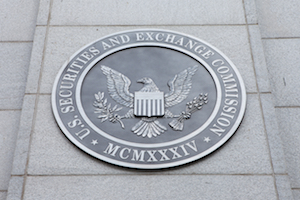 Nearly all registered investment advisers examined as part of a national initiative focused on advisory fees found widespread errors and inadequate disclosures, according to a new SEC Risk Alert.
Nearly all registered investment advisers examined as part of a national initiative focused on advisory fees found widespread errors and inadequate disclosures, according to a new SEC Risk Alert.
The SEC’s Division of Examinations recently concluded a national initiative that focused on advisory fees, predominantly those charged to retail clients, to assess the ways in which investment advisers charge fees, as well as the adequacy of fee disclosures, and compliance policies and procedures.
The staff conducted approximately 130 examinations of SEC-registered investment advisers under this initiative, where it identified deficiencies related to the advisory fees charged during most of these examinations. While all the examined advisers provided investment advice to retail clients, they also had a wide range of assets under management, business operations, staffing levels and affiliations.
Compliance Issues and Deficiencies
In this latest Risk Alert—which provides greater detail on compliance issues observed during the fee-initiative examinations and is a follow up to an earlier Advisory Fees Risk Alert—the SEC says that its observations centered around two primary fee-related deficiencies that often resulted in financial harm to clients, including:
- over-billing of advisory fees, inaccurate calculations of tiered or breakpoint fees, and inaccurate calculations due to incorrect householding of accounts; and
- not crediting certain fees due to clients, such as prepaid fees for terminated accounts or pro-rated fees for onboarding clients.
“Advisers that fail to adhere to the terms of their agreement and disclosures, or otherwise engage in inappropriate fee billing and expense practices, may violate their fiduciary duties and the Advisers Act, including its antifraud provisions,” the SEC warns in the alert.
According to the staff’s observations, the inaccurate calculations were due to a variety of errors, including:
- charging fees that were different from contractually agreed-upon rates and using incorrect fee schedules;
- failing to convert all clients to their new or updated fee schedule; and
- manually entering the wrong fee percentages into their portfolio management systems.
The SEC further observes that incorrect client account valuations were used. Here, the SEC notes that examined advisers included in their account valuations:
- assets that disclosures stated would be excluded from the fee calculations, such as legacy positions;
- stale account balance information as a result of the loss of data during transitions of portfolio management systems;
- incorrect valuation dates for client billings; and
- inaccurate account values due to timing differences in cash and dividend transactions in electronic custodial feeds compared to the available balance at the custodian.
Misleading Disclosures. Several of the examined advisers were identified as having a range of disclosure issues. The issues identified were related to incomplete or misleading Form ADV Part 2 brochures, as well as disclosures that did not accurately describe how fees would be charged or were inconsistent across advisory documents. The staff also identified examined advisers who did not have any written agreements or documentation establishing the client fee amount.
Inadequate Policies and Procedures. Many examined advisers also did not maintain written policies and procedures addressing advisory fee billing and the monitoring of fee calculations and billing. While some advisers had informal or unwritten practices in these areas, the Risk Alert notes that the SEC staff considers such issues to be relevant to the operations of the adviser, and thus, should be captured in written policies and procedures.
Industry Practices
As part of the Risk Alert, the SEC encourages advisers to regularly review and refine their fee billing policies and practices, and address new risks as they are identified. In addition, the SEC emphasizes that advisers should review their disclosures regarding such practices to ensure that clients are provided with accurate disclosures and related material conflicts of interest.
Noting that there is no such thing as a “one-size-fits-all” approach, the Risk Alert provides the following observed examples to assist advisers with compliance in these areas.
- Adopt and implement written policies and procedures addressing advisory fee billing processes and validating fee calculations.
- Centralize the fee billing process and validate that the fees charged are consistent with compliance procedures, contracts and disclosures.
- Ensure that resources and tools established for reviewing fee calculations are utilized, such as checklists for reconciling client fee calculations with advisory agreements.
- Properly record all advisory expenses and fees assessed to and received from clients, including those paid directly to advisory personnel.
This is the second Risk Alert on advisory practices issued this week; on Nov. 9 the SEC issued a Risk Alert warning about widespread compliance issues among advisers providing robo-advisory services, as well as with those who offer discretionary investment advisory programs.

